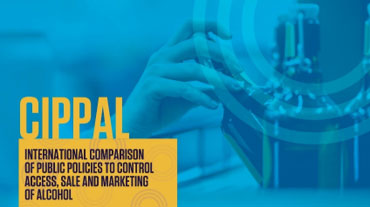CIPPAL
 In 2022, the French Monitoring Centre on Drugs and Addiction (OFDT) launched a foreshadowing consultation of an international reflection on policies to control the attractiveness and accessibility of alcohol.
In 2022, the French Monitoring Centre on Drugs and Addiction (OFDT) launched a foreshadowing consultation of an international reflection on policies to control the attractiveness and accessibility of alcohol.
Origin
Health policies aimed at reducing the damage caused by alcohol consumption are within the scope of observation of the OFDT and are a central topic addressed in its 2022-2025 work programme. Since 2015, the OFDT has been particularly interested in young people’s exposure to alcohol marketing approaches, by developing an exhibition measurement module (FAMES) and an observational study in supermarkets, music festivals, sport settings and on the Internet. The rise in reports of domestic/partner violence during the Covid-19 health crisis has heightened concern about the accessibility of alcohol.
Objectives
Base on the consultation of French and international experts, the foreshadowing will help to draw up by the end of 2022 a list of relevant political axes and national examples to be deepened through an International Comparison of Public Policies for Controlling the Attractiveness and Accessibility of Alcohol (CIPPAL).
Partnership
The study is carried out by the OFDT, within the Focus scientific unit, with the financial support of the Fonds de lutte contre les conduites addictives (Fund to Combat Addictive Behaviour) of the National health insurance fund and the participation of a multidisciplinary group of ten European and Canadian scientific experts (in public health, economics, sociology, social marketing). The project is funded under the 2022 edition for a period of one year.
Method
The pool of experts was established on the basis of a documentary collection on sales control policies, advertising and taxation in the field of alcohol, with a desire for Western geographical diversity. The experts' opinions are collected using a simplified Delphi method (in two rounds), regarding the relevant policies implemented in their respective countries and the exemplary approaches that are worth to be highlighted at the international level. The first round of consultation is based on an online survey addressed to each expert. In a second round, a videoconference with the OFDT and the experts will allow to compare opinions, to draw up points of convergence as well as grey areas and emerging issues.
Results
In December 2022, a study report will summarise the expert consultation and outline the methodological and collaborative perspectives of a two-year international comparison project on public policies to control the attractiveness and accessibility of alcohol.
Drugs in Europe
![]() 2023 EMCDDA European Drug Report
2023 EMCDDA European Drug Report
The European Drug Report 2023: Trends and Developments presents the EMCDDA’s latest analysis of the drug situation in Europe. Focusing on illicit drug use, related harms and drug supply, the report contains a comprehensive set of national data across these themes and key harm-reduction interventions. This report is based on information provided to the EMCDDA by the EU Member States, the candidate country Türkiye, and Norway, in an annual reporting process.
The annual Statistical Bulletin contains the most recent available data on the drug situation in Europe provided by the Member States. These datasets underpin the analysis presented in the European Drug Report. All data may be viewed interactively on screen and downloaded in Excel format.
![]() The European Union and the drug phenomenon
The European Union and the drug phenomenon
 The European Union & the drug phenomenon : Frequently asked questions, joint publication between the EMCDDA and the European Commission, october 2010, 12 p.
The European Union & the drug phenomenon : Frequently asked questions, joint publication between the EMCDDA and the European Commission, october 2010, 12 p.



